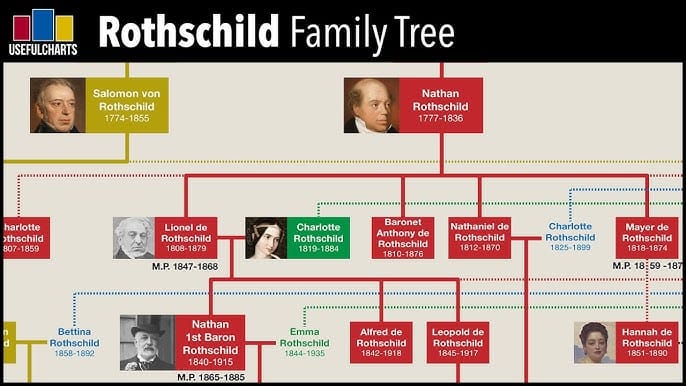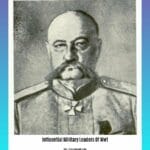From Humble Origins to Global Influence: The Rockefeller Story
The Rockefeller family name is synonymous with American wealth and influence. Their story, spanning from humble German origins to becoming titans of industry and philanthropy, is a captivating journey through American history.
Humble Beginnings in Germany
The Rockefeller saga begins in the Rheinland region of Germany, where Johann Peter Rockefeller decided to leave his homeland in the early 1700s, seeking new opportunities in America. He settled in Philadelphia and later became a plantation owner in New Jersey, laying the groundwork for future generations.
Johann Peter’s descendant, William Avery Rockefeller, John D. Rockefeller’s father, was a businessman known for his unorthodox practices. John D.’s mother, Eliza Davison Rockefeller, instilled values of stability and success in her children. This blend of German and Scots-Irish ancestry, from Eliza’s side, likely played a significant role in shaping the family’s character and ambition.
John D. Rockefeller: Architect of an Empire
John D. Rockefeller Sr. revolutionized the oil industry with the founding of Standard Oil. His sharp business acumen and drive allowed him to amass unprecedented wealth, forever changing the landscape of American business.
However, Rockefeller’s legacy extends beyond wealth accumulation. As he transitioned into later life, he became a prominent philanthropist, establishing foundations and initiatives that continue to impact the world today. This dedication to giving back became a core value within the Rockefeller family.
A Family Legacy: Shaping Industries and Society
Despite their immense wealth, John D. and his wife, Laura Spelman Rockefeller, instilled in their six children the importance of hard work, education, and community engagement. The family generally avoided the spotlight, preferring a more private life despite their significant influence.
Subsequent generations pursued diverse interests, from politics and finance to philanthropy and the arts. This diversification reflects the family’s encouragement of individual pursuits and commitment to making a difference.
Notable descendants who left their own marks on history include:
- John D. Rockefeller Jr.: A dedicated philanthropist, perhaps best known for his role in developing Rockefeller Center in New York City.
- Nelson Rockefeller: He served as Governor of New York and Vice President of the United States, known for his progressive policies and commitment to social justice.
- David Rockefeller: He made his mark in finance as chairman and CEO of Chase Manhattan Bank and followed in his family’s footsteps as a dedicated philanthropist.
- Winthrop Rockefeller: Driven by social responsibility, he served as Governor of Arkansas, championing racial integration and leaving a lasting impact on the state.
Is the Rockefeller Bloodline Still Alive?
Yes, the Rockefeller bloodline is very much alive and thriving.
Defying the adage that wealth dissipates within three generations, the Rockefellers have maintained their fortune and influence for over a century, now spanning seven generations and over 200 members.
What’s even more remarkable is that they haven’t just held onto their wealth; they’ve adapted and evolved. Today’s Rockefellers are involved in diverse fields, from fashion and finance to technology and politics.
Here are just a few examples:
- David Rockefeller Jr.: The great-grandson of John D. Rockefeller, he’s a leading voice in wealth management and philanthropy, often sharing insights into the family’s enduring success.
- Ariana Rockefeller: This fashion designer showcases the family’s evolving influence beyond traditional industries.
- Indre Rockefeller: This entrepreneur demonstrates the younger generation’s drive to forge their own paths.
- Justin Rockefeller: Continuing the family’s presence in the political sphere, he’s actively engaged in public service.
A Legacy of Giving: Philanthropy and Social Impact
The Rockefellers have consistently demonstrated a deep commitment to giving back. This tradition of philanthropy, beginning with the establishment of the Rockefeller Foundation in 1913, has been instrumental in tackling global challenges in areas like education, healthcare, and the arts.
While previous generations focused on amassing wealth, today’s Rockefellers are increasingly driven by social impact. They are leveraging their influence and resources to address pressing global issues, proving that wealth and meaning can go hand in hand.
The Rockefeller story is a testament to adaptability, resilience, and the enduring power of a family legacy. They’ve navigated economic shifts, societal changes, and evolving values, all while remaining a force to be reckoned with. It begs the question: What will the Rockefellers be known for a hundred years from now? Only time will tell, but one thing is certain: they’re a family that understands the responsibility of great fortune and continues to leave an undeniable mark on the world.
Unraveling the Rockefeller Ancestry: A Tapestry of German and Scots-Irish Heritage
The Rockefeller family history is deeply intertwined with the story of American immigration and cultural blending. While often associated with their American identity, their roots trace back to 17th-century Germany, with significant influences from Scots-Irish heritage.
Johann Peter Rockefeller: The Journey Begins
The Rockefeller story begins in the picturesque Rhineland region of Germany. Johann Peter Rockefeller, born there in 1681, made the life-altering decision to emigrate to America around 1723. He settled in Philadelphia before establishing himself as a plantation owner and landowner in New Jersey, setting the stage for future generations.
The Scots-Irish Influence: Eliza Davison Rockefeller
The family’s heritage took a significant turn with William A. Rockefeller Sr., who married Eliza Davison, a descendant of Scots-Irish farmers in Middlesex County, New Jersey. This union introduced a new cultural dimension to the family tree. Eliza’s influence, combined with the family’s German roots, likely contributed to their strong work ethic and entrepreneurial spirit.
Read more about the Rosa Parks Bus MTA and her involvement in the civil rights movement.
The Rockefeller Brothers: Inheriting a Legacy
John D. Rockefeller and William A. Rockefeller Jr., the architects of the family’s oil fortune, inherited this mixed German and Scots-Irish ancestry. Their success with Standard Oil cemented their place in American history, but their story is also a reminder of the complex cultural tapestry that underlies many American families.
Exploring the Nuances of a Family’s Identity
While the Rockefellers are predominantly known for their American identity and astonishing wealth, it’s essential to consider the nuances of their multi-faceted heritage:
- Beyond Binary Ethnicity: How did the Rockefellers navigate their dual heritage in a rapidly changing American landscape? Did they identify more strongly with one side over the other, and how might this have influenced their public image and business dealings?
- The Immigrant Success Story: While often seen as the epitome of the American Dream, the Rockefellers’ story can be viewed through a more critical lens. Did their heritage provide advantages, or did they encounter challenges and discrimination due to their background?
- Philanthropy and Cultural Bias: How did the Rockefellers’ wealth, shaped by their diverse heritage, influence their philanthropic choices? Did their giving reflect a particular cultural leaning or potential biases?
By examining these complexities, we gain a richer understanding of the Rockefeller family and the role of immigration and heritage in shaping American identity. Their story reminds us that even seemingly straightforward narratives often hold layers of cultural influences that have shaped their actions and impact on the world.
- Crypto Quotes’ Red Flags: Avoid Costly Mistakes - June 30, 2025
- Unlock Inspirational Crypto Quotes: Future Predictions - June 30, 2025
- Famous Bitcoin Quotes: A Deep Dive into Crypto’s History - June 30, 2025
















